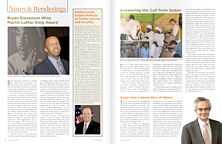Law Professors Testify on Voting Rights Act
Printer Friendly VersionIn separate appearances in May, Law School Professors Samuel Issacharoff and Richard Pildes told the Senate Judiciary Committee that a controversial portion of the Voting Rights Act designed to protect the ability of minorities to have a voice in our government might no longer be necessary.
In July, however, Congress voted to renew the measure, called Section 5, which was enacted at the height of the civil rights movement in 1965—several months after three voting rights activists were killed in Mississippi and after state and local police in the South attacked 600 civil rights protesters on a march from Selma to Montgomery, Alabama.
Last renewed in 1982, Section 5 requires some areas of the country—mostly Southern states—to obtain approval (called preclearance) from the Justice Department before any changes to election practices or procedures can go into effect.
Given the vast changes in U.S. society in the 41 years since the law was enacted, Section 5 doesn’t necessarily make sense in its current form, Issacharoff told the panel on May 9. He urged legislators to ease some of the procedural requirements currently faced by jurisdictions covered by the provision. He also warned that as the political parties vie for voters, Section 5 can be misused by officials basing decisions on party politics. “Unfortunately,” he said, “the emergence of real bipartisan competition in covered jurisdictions has brought with it concerns of preclearance objections motivated by political gain, particularly in the highly contested area of redistricting.”
A week later, Pildes raised some of the same points, and also criticized a proposal to revise the Section 5 language to repudiate the 2003 U.S. Supreme Court decision in Georgia v. Ashcroft. In that case, the Supreme Court said that a redistricting in Georgia should have been allowed, even though the Justice Department declined to approve the change.
“Here were black and white legislators, willing to make their seats more dependent upon interracial voting coalitions. Yet the Act would have imposed on them more racially homogenous constituencies,” he testified. “And here were black legislators, not demanding safer sinecures for themselves, as officeholders typically do, but taking risks, cutting deals and exercising political agency to forge a winning coalition. Yet the Act would have denied these political actors the autonomy to make the hard choices at issue, even with partisan control of state government at stake.”
Issacharoff’s appearance was his second before the committee this year. In January, he testified on a somewhat related matter during the confirmation hearings for Samuel Alito. In 1985, the nominee had written on a job application that he disagreed with Supreme Court decisions in the 1960s about reapportionment, and the idea that states had to structure government to implement the “one-person, one-vote” principle.
“That such doubts about the reapportionment cases should reappear on a job application in the 1980s is at least a curiosity,” Issacharoff testified. While he didn’t recommend rejecting Alito, he urged the Senate to be sure that Supreme Court justices are committed to protecting the right to vote. “Before confirming any nominee to the Supreme Court,” he testified, “the Senate of the United States should be able to conclude with confidence that, regardless how a nominee may vote on any given case, there is no doubt that he or she will assume the responsibility of protecting the integrity of our democratic processes.”
